18 oct 2016
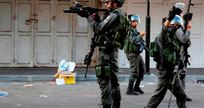
The Israeli Occupation Forces (IOF) stormed Tuesday afternoon a local market in al-Khalil and shut down the commercial shops to allow Israeli settlers’ “safe” passage to the Ibrahimi Mosque.
According to the PIC reporter, Israeli soldiers stormed in large numbers the local market and forced the residents to leave the area before closing all the commercial stores.
Israeli soldiers heavily fired teargas bombs at the stores’ owners, causing a number of suffocation problems among them.
The Israeli restrictions came to pave the way for dozens of settlers from different illegal settlements to celebrate their Jewish holiday in the Ibrahimi Mosque.
According to the PIC reporter, Israeli soldiers stormed in large numbers the local market and forced the residents to leave the area before closing all the commercial stores.
Israeli soldiers heavily fired teargas bombs at the stores’ owners, causing a number of suffocation problems among them.
The Israeli restrictions came to pave the way for dozens of settlers from different illegal settlements to celebrate their Jewish holiday in the Ibrahimi Mosque.
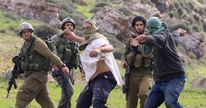
Dozens of Israeli settlers stormed Tuesday afternoon Dura town in al-Khalil and raised the Israeli flag in total provocation to the local residents.
Scores of armed settlers from Adora settlement stormed the town under the protection of Israeli soldiers. Settlers broke into a large agricultural land in the town and erected a number of tents, the PIC reporter said.
Palestinian farmers were prevented from approaching their agricultural lands.
The agricultural area has witnessed similar attacks on more than one past occasion especially during Jewish holidays.
Scores of armed settlers from Adora settlement stormed the town under the protection of Israeli soldiers. Settlers broke into a large agricultural land in the town and erected a number of tents, the PIC reporter said.
Palestinian farmers were prevented from approaching their agricultural lands.
The agricultural area has witnessed similar attacks on more than one past occasion especially during Jewish holidays.
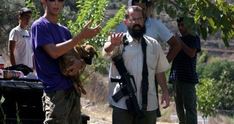
A group of Israeli settlers stormed on Tuesday morning a Palestinian-owned home in Tel Rumeida town in al-Khalil under the protection of Israeli forces.
According to the PIC reporter, nearly seven Israeli settlers stormed a local home belonging to Abdul-Fattah al-Tamimi in Tel Rumeida town in al-Khalil and brutally attacked all the family members while harvesting their olive trees near the house.
The olive harvest was confiscated by the settlers, who then threatened the family members if they return to pick up olives from their own trees.
Following the attack, al-Tamimi’s wife lost her consciousness as she was brutally beaten by the settlers.
According to the PIC reporter, nearly seven Israeli settlers stormed a local home belonging to Abdul-Fattah al-Tamimi in Tel Rumeida town in al-Khalil and brutally attacked all the family members while harvesting their olive trees near the house.
The olive harvest was confiscated by the settlers, who then threatened the family members if they return to pick up olives from their own trees.
Following the attack, al-Tamimi’s wife lost her consciousness as she was brutally beaten by the settlers.
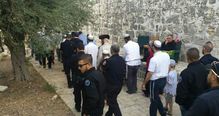
Groups of Jewish settlers on Tuesday morning desecrated the Aqsa Mosque’s courtyards under tight police protection.
Local sources said that two groups of settlers escorted by police forces toured the Mosque’s courtyards in the morning.
Meanwhile, the Israeli police restricted the entry of Muslims to the Mosque and prevented several women from going in at the pretext there was still a ban on their presence in the Islamic holy site.
Local sources said that two groups of settlers escorted by police forces toured the Mosque’s courtyards in the morning.
Meanwhile, the Israeli police restricted the entry of Muslims to the Mosque and prevented several women from going in at the pretext there was still a ban on their presence in the Islamic holy site.
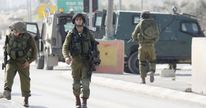
The Israeli occupation forces (IOF) on Tuesday morning stormed Sebastia town, north of Nablus, and cordoned off the archaeological area and al-Bayader Square as a prelude to the coming of several Jewish settlers aboard buses.
Local sources reported that Israeli soldiers prevented any Palestinian from entering al-Bayader area and ordered them to stay away.
They added that the Israeli army also deployed troops at the entrance to the town as part of its security measures ahead of the settlers’ visit.
Locals have voiced fears that the settlers’ growing visits to the Palestinian archaeological sites in Sebastia could portend intents to take them over.
Local sources reported that Israeli soldiers prevented any Palestinian from entering al-Bayader area and ordered them to stay away.
They added that the Israeli army also deployed troops at the entrance to the town as part of its security measures ahead of the settlers’ visit.
Locals have voiced fears that the settlers’ growing visits to the Palestinian archaeological sites in Sebastia could portend intents to take them over.
16 oct 2016
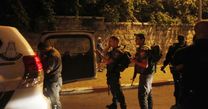
The Israeli occupation forces (IOF) on Saturday night assaulted Palestinian citizens and showered them with tear gas on the main road to Azzun town, east of Qalqiliya province.
Local sources told the Palestinian Information Center (PIC) that Israeli troops closed once again the road leading to Azzun town after residents opened it recently.
They added that the soldiers obstructed the movement of citizens and vehicles on the road and at the entrance to the town.
Meanwhile, a group of Jewish settlers committed acts of bullying against Palestinian citizens on another road near Azzun town, according to eyewitnesses.
Earlier on the same day, the Israeli army reclosed the main road leading to Aqraba town, south of Nablus, a few days after locals opened it.
Eyewitnesses told the PIC that Israeli bulldozers belonging to the army closed the road anew with mounds of dirt and rocks as well as concrete blocks.
The Israeli army had closed the road several months ago, but local residents managed to open it many times.
Local sources told the Palestinian Information Center (PIC) that Israeli troops closed once again the road leading to Azzun town after residents opened it recently.
They added that the soldiers obstructed the movement of citizens and vehicles on the road and at the entrance to the town.
Meanwhile, a group of Jewish settlers committed acts of bullying against Palestinian citizens on another road near Azzun town, according to eyewitnesses.
Earlier on the same day, the Israeli army reclosed the main road leading to Aqraba town, south of Nablus, a few days after locals opened it.
Eyewitnesses told the PIC that Israeli bulldozers belonging to the army closed the road anew with mounds of dirt and rocks as well as concrete blocks.
The Israeli army had closed the road several months ago, but local residents managed to open it many times.
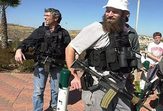
A number of extremist Israeli settlers attacked a Palestinian from Silwan town with a knife, and beat him with clubs, while he was passing Bar Elan Street, in Jerusalem, Wadi Hilweh Information Center reported, according to Al Ray.
“[At] around ten o’clock in the evening, [as] I was riding my motorcycle and passing Bar Elan Street, a group of five Israeli settlers attacked me with a knife, and hit me with clubs,” 26-year-old Moahmmed Razem stated.
Razem added that he tried to escape but could not, while the settlers ran away when they saw a police patrol passing in the street.
He was injured in his thigh, as they attacked him with a knife, in addition to some bruises, and was taken to a nearby hospital.
“[At] around ten o’clock in the evening, [as] I was riding my motorcycle and passing Bar Elan Street, a group of five Israeli settlers attacked me with a knife, and hit me with clubs,” 26-year-old Moahmmed Razem stated.
Razem added that he tried to escape but could not, while the settlers ran away when they saw a police patrol passing in the street.
He was injured in his thigh, as they attacked him with a knife, in addition to some bruises, and was taken to a nearby hospital.
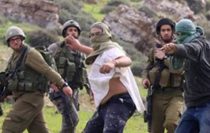
Dozens of extremist Israeli colonists attacked, Sunday, Palestinians harvesting their olive orchards, in a number of villages and towns, west of the northern West Bank city of Nablus.
Ghassan Daghlas, the Palestinian Authority (PA) official in charge of monitoring Israeli settlement policies in the occupied territories, said that the colonists came from the illegal outpost of Havat Gilad that was established on privately owned Palestinian lands.
Daghlas added that the Palestinians had a prior arrangement with the Israeli District Coordination Office, allowing them to enter their orchards, isolated behind the Annexation Wall.
The attack led to some confrontations between the Israeli attackers and the locals, before the army intervened, yet, the soldiers forced many Palestinians out of their lands, and prevented others from even entering their own orchards.
Ghassan Daghlas, the Palestinian Authority (PA) official in charge of monitoring Israeli settlement policies in the occupied territories, said that the colonists came from the illegal outpost of Havat Gilad that was established on privately owned Palestinian lands.
Daghlas added that the Palestinians had a prior arrangement with the Israeli District Coordination Office, allowing them to enter their orchards, isolated behind the Annexation Wall.
The attack led to some confrontations between the Israeli attackers and the locals, before the army intervened, yet, the soldiers forced many Palestinians out of their lands, and prevented others from even entering their own orchards.
14 oct 2016
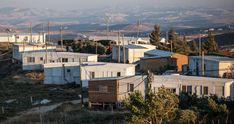
Israeli premier Benjamin Netanyahu decided in a meeting on Thursday with some of his right-wing ministers to ask the high court of justice for a six-month delay in evacuating the illegal West Bank outpost of Amona.
According to Israel’s Channel 10, the decision to appeal to the court was made after education minister Naftali Bennett, who heads the Bayit Yehudi party, threatened Netanyahu that his party would leave the coalition if the evacuation of Amona was not postponed or canceled.
Netanyahu then met with Bennett, justice minister Ayelet Shaked (Bayit Yehudi), war minister Avigdor Lieberman and other senior government officials in order to find a solution to Amona, which was built in 1995 on Palestinian-owned land east of Ramallah.
The government now plans to let Amona stay on the same hilltop but not at its current location. The goal is to make every effort to relocate it to a nearby annexed plot of Palestinian land.
The high court has already given the government two years to arrange Amona’s evacuation.
According to Israel’s Channel 10, the decision to appeal to the court was made after education minister Naftali Bennett, who heads the Bayit Yehudi party, threatened Netanyahu that his party would leave the coalition if the evacuation of Amona was not postponed or canceled.
Netanyahu then met with Bennett, justice minister Ayelet Shaked (Bayit Yehudi), war minister Avigdor Lieberman and other senior government officials in order to find a solution to Amona, which was built in 1995 on Palestinian-owned land east of Ramallah.
The government now plans to let Amona stay on the same hilltop but not at its current location. The goal is to make every effort to relocate it to a nearby annexed plot of Palestinian land.
The high court has already given the government two years to arrange Amona’s evacuation.
13 oct 2016
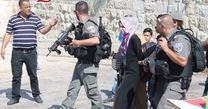
The Israeli occupation police on Thursday arrested a Palestinian young woman at the entrance to Bab (gate of) Qattanin, claiming she was found in possession of a knife.
According to local sources, police personnel at the gate detained the girl after searching her bag and finding a knife inside it.
The girl, whose identity is still unknown, was taken to a police station in the Old City of Jerusalem.
In another incident, 66 Jewish settlers have reportedly desecrated the Aqsa Mosque’s courtyards under police protection in the morning, amid restrictions on the entry of Muslims to their holy site.
According to local sources, police personnel at the gate detained the girl after searching her bag and finding a knife inside it.
The girl, whose identity is still unknown, was taken to a police station in the Old City of Jerusalem.
In another incident, 66 Jewish settlers have reportedly desecrated the Aqsa Mosque’s courtyards under police protection in the morning, amid restrictions on the entry of Muslims to their holy site.
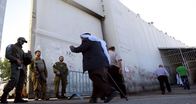
The Israeli groups, Peace Now and Ir Amim, have recently released a joint report on Israel’s settlement expansion in Batan al-Hawa neighborhood of Silwan, the most sensitive and volatile areas in Occupied Jerusalem.
The report, titled “Broken Trust: State Involvement in Private Settlement in Batan Al-Hawa, Silwan,” describes how, since 2001, the government-backed Ateret Cohanim settler organization has been working on transforming Batan al-Hawa into a large Israeli settlement through questionable acquisition of Palestinian properties and forced eviction and removal of Palestinian families who have lived in the neighborhood for decades.
The report warned that Batan al-Hawa would become the largest settlement compound in a Palestinian neighborhood in the Historic Basin of the Old City, significantly contributing to the emerging ring of settlements around the Old City, creating an irreversible reality and severely undermining the possibility of a future two-state solution.
Ateret Cohanim’s frenzied attempts to take over the Palestinian neighborhood threaten to displace 100 families, composed of 600 Palestinians, from their homes.
By the end of 2015, the settler organization had quadrupled the number of housing units in its possession, taking over a total of some 27 units in six buildings in the neighborhood. There are also 12 other Palestinian units, where an additional 51 families are living, currently pending eviction claims.
The groups accused the government of acting through the General Custodian and the Registrar of Trusts, both under the Israeli ministry of justice, to facilitate settlers’ seizure of Batan al-Hawa, as well as providing roughly one million shekels each year to fund private security to radical settlers in the hearts of Palestinian neighborhoods in east Jerusalem.
“The settlement in Batan al-Hawa is an integral part of efforts by settler organizations and Israeli authorities to consolidate Jewish control of the Old City and the surrounding Palestinian neighborhoods, to create an irreversible reality in the Holy Basin around the Old City that deliberately subverts efforts to negotiate an agreed political resolution on Jerusalem,” the groups warned.
The report, titled “Broken Trust: State Involvement in Private Settlement in Batan Al-Hawa, Silwan,” describes how, since 2001, the government-backed Ateret Cohanim settler organization has been working on transforming Batan al-Hawa into a large Israeli settlement through questionable acquisition of Palestinian properties and forced eviction and removal of Palestinian families who have lived in the neighborhood for decades.
The report warned that Batan al-Hawa would become the largest settlement compound in a Palestinian neighborhood in the Historic Basin of the Old City, significantly contributing to the emerging ring of settlements around the Old City, creating an irreversible reality and severely undermining the possibility of a future two-state solution.
Ateret Cohanim’s frenzied attempts to take over the Palestinian neighborhood threaten to displace 100 families, composed of 600 Palestinians, from their homes.
By the end of 2015, the settler organization had quadrupled the number of housing units in its possession, taking over a total of some 27 units in six buildings in the neighborhood. There are also 12 other Palestinian units, where an additional 51 families are living, currently pending eviction claims.
The groups accused the government of acting through the General Custodian and the Registrar of Trusts, both under the Israeli ministry of justice, to facilitate settlers’ seizure of Batan al-Hawa, as well as providing roughly one million shekels each year to fund private security to radical settlers in the hearts of Palestinian neighborhoods in east Jerusalem.
“The settlement in Batan al-Hawa is an integral part of efforts by settler organizations and Israeli authorities to consolidate Jewish control of the Old City and the surrounding Palestinian neighborhoods, to create an irreversible reality in the Holy Basin around the Old City that deliberately subverts efforts to negotiate an agreed political resolution on Jerusalem,” the groups warned.
